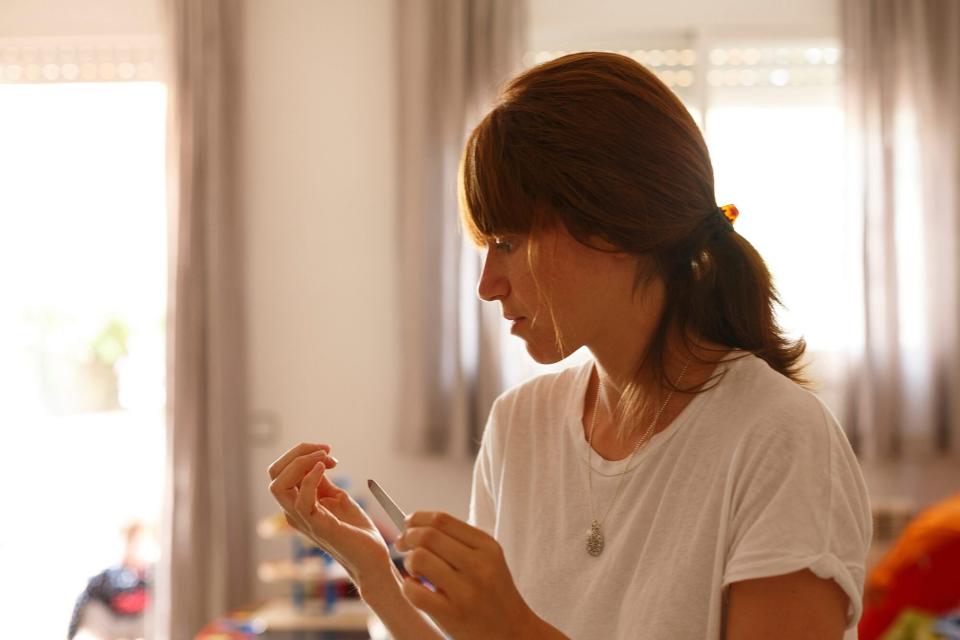Dermatologist-Approved Tips for Growing Stronger, Healthier Nails
It's not just a nuisance: Breaking a nail can be downright painful. One way to stop your nails from cracking in the future is by strengthening them from the inside out; in order to do so, you must first figure out what's causing your nails to be weak and brittle in the first place. In some cases, frequently chipped or cracked nails can even be an indicator of a bigger health issue. According to board-certified dermatologist and assistant clinical professor of dermatology at the Mount Sinai School of Medicine Dr. Jeannette Graf, our nails are a reflection of our overall health. She explains that many of our daily habits strip the moisture in fingernails, which then causes them to weaken over time. She lists a poor diet, overwashing and drying hands multiple times a day, and frequently using detergents, household cleaners, harsh polishes and nail polish removers as some of the reasons why nails become more prone to breakage.

Quim Roser / Getty Images
Board-certified dermatologist at MDCS Dermatology Dr. Marisa Garshick says other factors, such as genetics and our environment, play roles in whether we have strong nailbeds or not. She also says medical conditions such as changes in the thyroid or prior infection and stress can cause brittleness. Luckily, there are a number of good ways to strengthen your nails. Both Dr. Graf and Dr. Garshick share their tips and tricks here.
Related: Four Tips for Ensuring You Have Strong, Healthy Nails for Your Entire Life
Use nail strengthening products.
There are plenty of products that you can use to make sure your nails don't break. Dr. Garshick says using products like Vaseline Healing Jelly ($15.99, amazon.com) or any petroleum jelly-based ointment nightly will help trap moisture and strengthen the nail. She adds that it also helps keep the skin around the nail—the periungual area—soft and smooth; this will minimize trauma and inflammation and help make the nail appear healthier.
She also recommends using cuticle oil as it helps hydrate the cuticle as well as the nail bed. Dr. Graf agrees and recommends something like ISDIN's Si-Nails ($29.95, amazon.com) nail serum as it's been proven to increase nails' thickness, density, and durability.
Take vitamin supplements.
Dr. Graf says that taking the right vitamins is key to getting strong nails. "Protein helps produce keratin and keratin keeps the nails strong and healthy," she says. "Biotin helps strengthen nails as well as promote [nail growth]."
Dr. Garshick says that it all depends on what the nails look like and what nutritional deficiencies you might have. While biotin deficiency has been associated with brittle nails, she says the only way to confirm it is through a blood test. She adds that in February 2017, the U.S. Food & Drug Administration (FDA) warned that taking biotin supplements may interfere with certain laboratory tests such as those for thyroid and detecting heart attacks, so always consult your doctor before adding any vitamins or supplements to your routine.
Change your daily habits.
Adjusting your daily habits can also help your nails grow stronger over time. "Be gentle with your nails and try to minimize using your nails as tools to open things," says Dr. Garshick. "Try to keep your nails trimmed so they don't snag on things which may make them more susceptible to breakage." Another tip is to avoid exposing hands to water for a prolonged period of time. If you're washing dishes, for example, she says to wear gloves.
Dr. Graf agrees and lists other habits such as eating a well-balanced diet (she says to have a diet that consists of fresh fruits and vegetables, lean sources of proteins, an adequate amount of carbohydrates, and plenty of healthy fats), avoiding nail-biting, and taking breaks from using nail polish can also help the health of your nails. She adds that some abnormalities to the nail are harmless; texture and color can change temporarily if you've been wearing fake nails or polish for a while. But if areas around the nail start to hurt, change in color for a long period of time, bleed, swell, or separate from the skin, then consult a professional.
